border
Latest

Border agents can't search cellphones of NYC visitors without a warrant, court rules
The decision was a win for civil liberties groups.
Sarah Fielding07.29.2024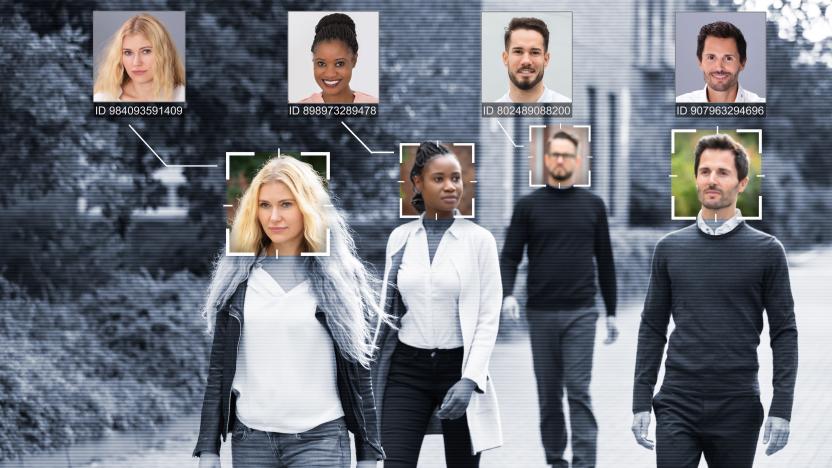
European Parliament calls for a ban on facial recognition in public spaces
MEPs also said private facial recognition databases like Clearview AI should be prohibited.
Kris Holt10.06.2021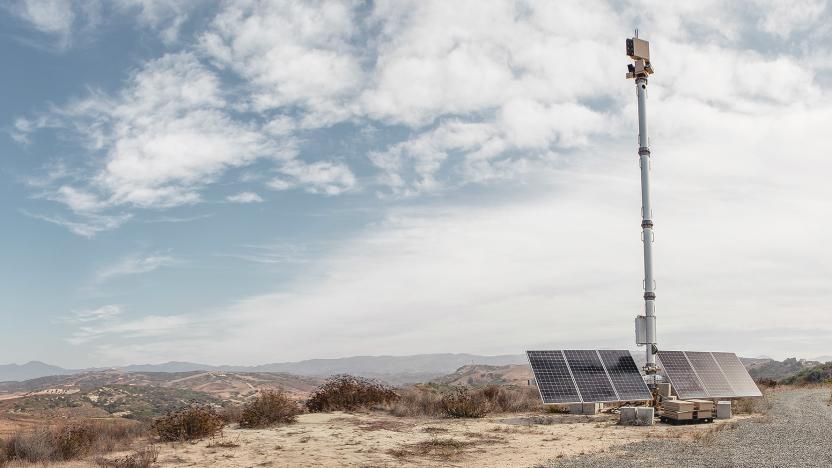
Palmer Luckey's startup will build a 'virtual' border wall
It's no secret that Palmer Luckey's Anduril Industries has been developing a "virtual wall" to heighten national security -- he's been at it for the better part of three years. According to a new report from the Washington Post, the Trump administration awarded Anduril a lucrative five-year contract to erect hundreds of AI-powered surveillance towers along the U.S.-Mexico border by 2022. “These towers give agents in the field a significant leg up against the criminal networks that facilitate illegal cross-border activity,” said Border Patrol Chief Rodney Scott in a statement released by U.S. Customs and Border Protection.
Chris Velazco07.02.2020
Federal agencies reportedly bought phone location data to track immigrants
Since at least 2017, the US federal government has been buying commercially-available cellphone location data to aid in immigration and border-related enforcement actions, according to a report from The Wall Street Journal. The data is the type of anonymized location information that analytics firms typically sell to digital advertisers so that they target specific consumers. In other words, it's information most people consent to sharing every time they install a new app on their phone.
Igor Bonifacic02.07.2020
Homeland Security doesn’t want Americans' airport face scans after all
Earlier this week, reports circulated that Homeland Security wanted to scan the faces of travelers, including US citizens, as they enter or leave the country. Naturally, critics raised concerns that the practice would violate citizens' privacy and that the "intrusive surveillance technology" could lead to abuses of power. Now, US Customs and Border Protection (CBP) says that it will allow US citizens to voluntarily participate in the program. In other words, US citizens can opt out.
Christine Fisher12.05.2019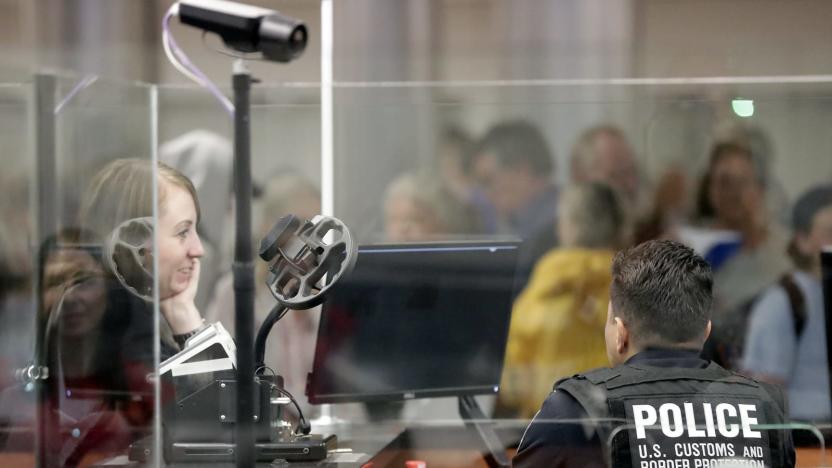
Federal judge rules suspicionless device searches at the border are illegal
Civil liberties advocates just scored an important victory in a bid to prevent arbitrary device searches at the US border. A federal court handling a 2017 lawsuit has ruled that US policies allowing device searches without valid suspicion or warrants violate Fourth Amendment protections against unreasonable searches and seizures. Judge Denise Casper noted that an exemption for searches at the border was "not limitless," and still needed to strike a balance between privacy and government interests. That usually means focusing on contraband, she said.
Jon Fingas11.12.2019
Chinese officials reportedly installed a surveillance app on tourists' phones
Chinese border guards are reportedly installing surveillance apps on the phones of some travelers. According to an investigation by the Guardian, The New York Times and Süddeutsche Zeitung, the app extracts emails, texts and contacts, as well as info about the device. Without notifying phone owners, border guards have installed the app when people attempt to cross from the Kyrgyzstan region to the Xinjiang region, an area where the Chinese government has long restricted the freedoms of the Muslim population.
Christine Fisher07.02.2019
Experimental AI lie detector will help screen EU travelers
In the future, you might talk to an AI to cross borders in the European Union. The EU and Hungary's National Police will run a six-month pilot project, iBorderCtrl, that will help screen travelers in Hungary, Greece and Latvia. The system will have you upload photos of your passport, visa and proof of funds, and then use a webcam to answer basic questions from a personalized AI border agent. The virtual officer will use AI to detect the facial microexpressions that can reveal when someone is lying. At the border, human agents will use that info to determine what to do next -- if there are signs of lying or a photo mismatch, they'll perform a more stringent check.
Jon Fingas10.31.2018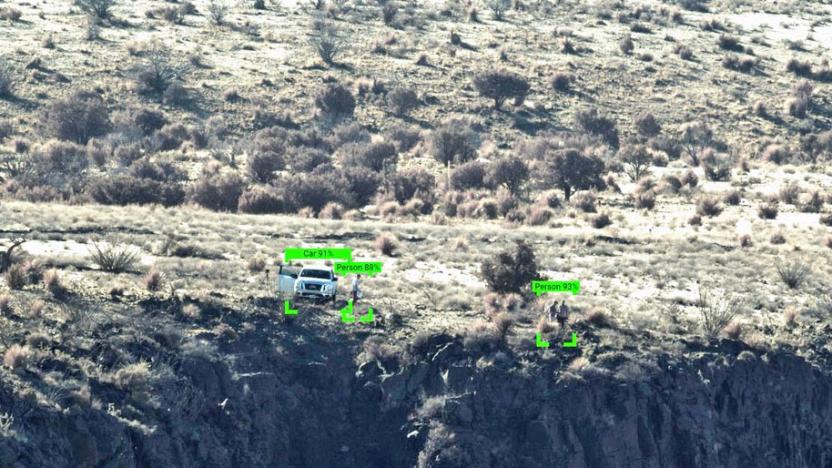
Palmer Luckey chases government contracts with 'virtual wall'
When you hear talk of a border wall, you typically picture an actual, physical construction. But that's not the case for Palmer Luckey. The Oculus co-founder and his startup Anduril Industries have been working on a virtual wall -- one complete with cameras, sensors and VR -- with the aim of scoring a US defense contract and providing border security at a fraction of the cost of a physical wall. Luckey discussed plans for this technology last year, but now it's being tested, both officially and unofficially, and it's catching the eye of US officials.
Mallory Locklear06.12.2018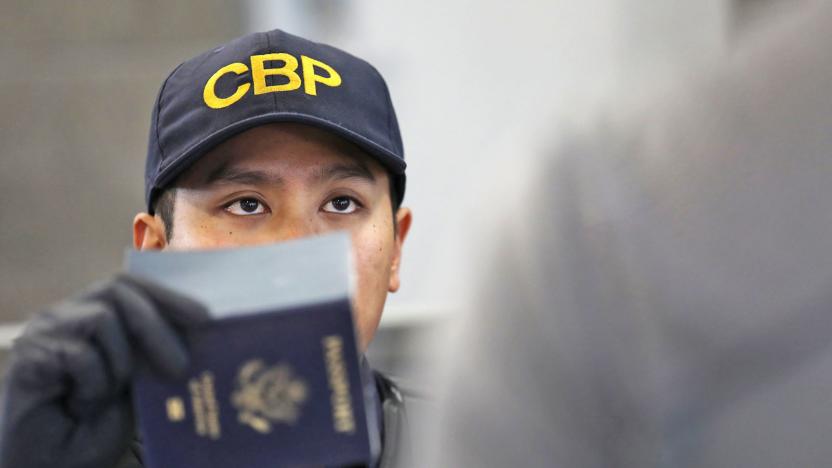
DHS will use facial recognition to scan travelers at the border
Last year, the Department of Homeland Security (DHS) put out a notice, saying it was looking for a facial recognition system that could work with images taken of people inside their cars. The idea was that such a system could be used to scan people entering and leaving the country through the US/Mexico border and match them to government documents like passports and visas. Now, The Verge reports that DHS will be launching a test of a system aiming to do just that.
Mallory Locklear06.05.2018
Bipartisan bill aims to curb warrantless phone searches at the border
The Trump administration revealed its "extreme vetting" procedures on Tuesday and hoo boy, are they draconian. They'll require foreign visitors -- even close allies like France and Germany -- to potentially reveal passwords, phone contacts and even financial records in order to enter the country. Americans are being searched as well, with Border Patrol forces increasingly demanding the same information from US citizens as they cross the border, but a newly introduced bicameral bill could help safeguard their privacy.
Andrew Tarantola04.04.2017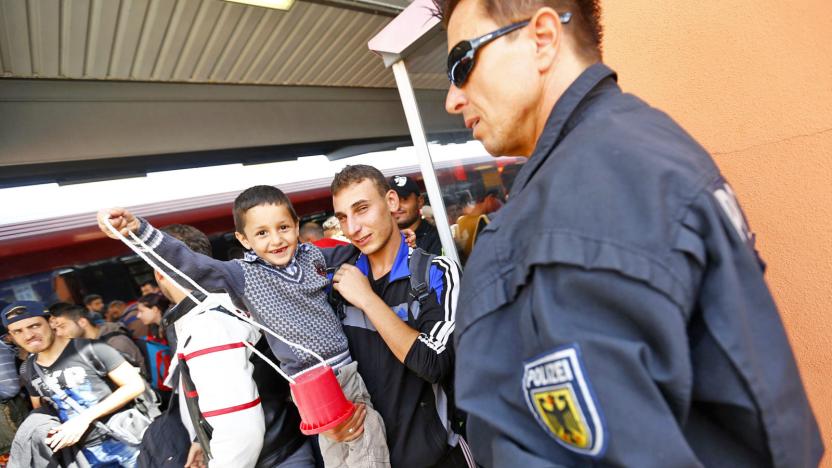
Germany to use voice recognition to identify refugee origins
Germany will soon use voice recognition tech to help figure out exactly where refugees came from, according to Die Welt. Though the number of asylum seekers coming to the nation in 2016 dropped significantly to 280,000 from 890,000 in 2015, there was still a backlog of 430,000 applications at the beginning of 2017. Authorities from the Federal Office for Migration and Refugees (BAMF) are therefore hoping the technology can help dialect experts to clear that number down.
Steve Dent03.17.2017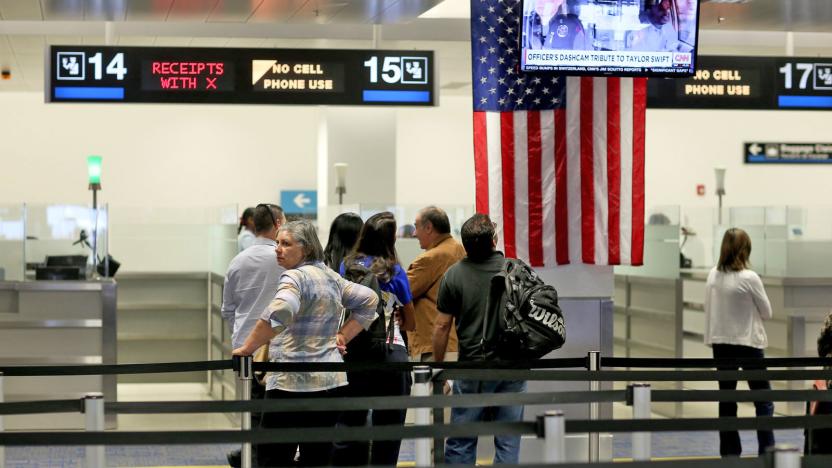
Senate bill would require a warrant for border phone searches
Did US border agents insist on searching the contents of your smartphone during your latest trip, privacy be damned? You're not alone -- Homeland Security has revealed that searches by Customs and Border Protection are surging, growing from under 5,000 in all of 2015 to 5,000 just this February. However, there might soon be legislation that keeps these searches in check. Oregon Senator Ron Wyden is preparing a bill that would not only require a warrant before border officials can search the devices of US citizens, but strictly forbid them from asking for passwords. They'd need a legitimate reason to believe your phone holds something shady, not just a hunch.
Jon Fingas03.13.2017
Robot agents will spare you from airport customs checks
If you're a frequent international flier, you know the pain of the customs check -- outside of the security inspection, it's one of the biggest hurdles you have to clear at the airport. You won't have to deal with it for much longer if Thales has its way. The electronics firm has developed a robot agent that not only checks you into your flight and prints tickets, but shares both a headshot and an iris scan with airport computers to verify whether or not you're a known threat. You wouldn't necessarily have to visit customs after landing in a new country -- you'd just leave the airport. Also, your boarding pass would include an encrypted version of that photo to save you the trouble of an ID inspection at the gate.
Jon Fingas06.22.2015
US judge rules warrantless gadget searches at the border aren't unconstitutional
A United States district judge has ruled that gadget searches upon crossing into the US aren't a breach of the First and Fourth Amendments. In 2010, the National Association of Criminal Defense Lawyers, National Press Photographers and grad student Pascal Abidor challenged the 2008 ruling that authorizes unwarranted device search-and-seizures, saying that they exist to counteract protected speech and certain confidentiality privileges. However, district judge Edward Korman remarks that because the chance of the searches is so low (he estimates odds of less than five in a million, although the government's count has been disputed) there aren't any grounds for dismissing the rulings. He further states that this is no different than having your baggage or person examined before crossing into the US, and that the government simply doesn't have enough resources to inspect the devices of everyone who enters the country. Most worrying however is when Korman says that it's "foolish, if not irresponsible" that the plaintiffs would store sensitive data on their gadgets in the first place. The ACLU is considering appealing the decision but attorney Catherine Crump tells the New York Times that for now the status quo remains, and in many areas of the country, "the government is free...to conduct all types of electronic device searches without reasonable suspicion." [Image credit: Flickr/Crashworks]
Timothy J. Seppala01.01.2014
US and Canada reach border spectrum sharing deals for broadband
Wireless use along the US-Canada border can be problematic: when there isn't direct interference, there's sometimes a fight over which devices get dibs on given frequencies. Don't worry that the countries will rekindle their old disputes, though -- instead, they've just struck interim deals to share more of their spectrum. Along with harmonizing 700MHz public safety networks, the pacts address AWS (1,700MHz and 2,100MHz), PCS (1,900MHz), 3.7GHz wireless broadband, mesh networks and even WiFi hotspots. When possible, both sides will use contention protocols to automatically resolve any conflicts. While the deals aren't yet final, they should be strong enough to maintain some semblance of peace on the northern airwaves. [Image credit: National Film Board of Canada. Photothèque / Library and Archives Canada]
Jon Fingas05.14.2013
AUO builds cellphone display with 'world's thinnest border'
Is that 3mm bezel getting you down? AUO says it has created the "world's narrowest" smartphone border on a new 4.46-inch 720P touch display -- just a single millimeter in width. That would put it in the same league as LG's Cinema Screen TVs, but in a smaller form factor, allowing manufacturers to reduce handset sizes without losing screen area. In related news, AUO also says it's developing Advanced Hyper-Viewing Angle (AHVA) tech, along with small form-factor IGZO displays, and that it's started shipping 4.97-inch 1920 x 1080, 443ppi screens. If all that means we have to squint less at our display, let the pixel density wars rage on.
Steve Dent10.29.2012
US opts to derez virtual fence along Mexico border, replacing it with more affordable measures
Remember that hugely ambitious "virtual fence" that the US Homeland Security department was so keen on blowing a few billion dollars on? Well, following a bunch of setbacks and delays in its development, it's now been determined to be too darn expensive and is being scrapped. That's not without splashing some cash, however, as it's estimated that a billion dollars has already been spent on installing sensor towers along a 53-mile stretch of the Arizona border with Mexico. The plan now is to redirect funds to more conventional (and commercially available) surveillance measures, such as thermal imaging and unmanned aerial drones, which is estimated to cost $750 million to cover the remaining 323 miles of Arizona's border. Whatever happens, keeping illegal immigration and contraband smuggling to a minimum isn't going to be a cheap task. Almost makes you wonder if this isn't a problem better solved by non-technological means.
Vlad Savov01.15.2011
El Paso resident finds Mexican Orbiter Mini drone in his front yard
When discussing drones, we usually think of the Af-Pak theater (or perhaps joy ridin' UK teens), so it was with some amusement that we heard about a little border excursion that a Mexican UAV made into American airspace a few days ago. According to reports, the device -- believed to be an Israeli-made Orbiter Mini -- was being operated by the Mexican government (on its side of the border) when it experienced some sort of "mechanical malfunction" and crossed over to El Paso, Texas, where it was discovered on a resident's front lawn last Tuesday. The Orbiter Mini, manufactured by Aeronautics Defense Systems, has a six foot wingspan and will stay in the air up to four hours.
Joseph L. Flatley12.21.2010
Google Maps causes border dispute between Nicaragua and (army-less) Costa Rica
Here's a interesting bizarre one. There's only one highway that connects Costa Rica and Nicaragua (I walked across it, shown above), but you can totally swim from one country to the other if you aren't afraid of circumventing authority. But if you're planning to traverse the San Juan over on the Caribbean side... well, who knows where you'll start and end. It's bruited that the Nicaraguan military recently invaded Costa Rica, lowered a Costa Rican flag and hoisted up a Nicaraguan one. Why? 'Cause Google Maps said so. Seriously. Nicaraguan commander Eden Pastora actually used a slightly inaccurate Google Maps portrayal as justification for invading land that's clearly shown as Costa Rican on official maps of both nations. In fact, this whole mess has grown into quite the debacle, with Costa Rican President Laura Chinchilla proclaiming that its northerly neighbor had "forgot where its border is." Moreover, Costa Rica is worried that dredging done by Nicaraguans on the river's edge is both altering the border in Nicaragua's favor and damaging vital flora and fauna in the surrounding area. We're hearing that Organization of American States Secretary General Jose Miguel Insulza will soon meet with officials in both nations to get this ironed out peacefully, and considering that Costa Rica hasn't had a military in over three score, we know who's hoping that the guns stay holstered. So much for Pura Vida, huh? [Thanks, Ignacio]
Darren Murph11.05.2010